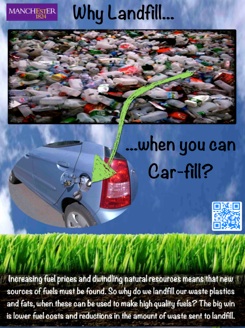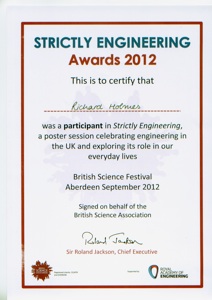British Science Festival 2012
As part of the 2012 British Science Festival in Aberdeen, I presented my research into alternative fuel sources and catalytic recycling.
My work currently covers two major themes:-
- Recycling of waste plastics into petroleum.
- Modification of Tallow-derived Biodiesel to improve cold flow properties.
Both of these projects are concerned with waste reduction, minimisation of landfill and recycling of feedstocks from waste materials.
The basic premise of the work is :-
Why Landfill... when you can car-fill?
- Increasing fuel prices and dwindling natural resources means that new sources of fuels must be found.
- So why do we landfill our waste plastics and fats, when these can be used to make high quality fuels?
- The big win is lower fuel costs and reductions in the amount of waste sent to landfill.
These projects use catalysts to perform efficient transformations of the raw starting material into useful, economically viable products.


Research Team
This work is conducted in collaboration with Dr Arthur Garforth, Dr Aaron Akah and Dr Alastair Martin in the School of Chemical Engineering and Analytical Science at the Univeristy of Manchester.
We are currently funded by UMIP (Plastics to Fuels) and the EPSRC / Argent Energy (Biodiesel), and have a number of research students working on associated projects.

![]()

Plastics to Fuel
This work has been demonstrated at Laboratory scale and offers 100% conversion of waste polymers / plastics to usable naphtha fuel fractions.
Conversion occurs at low temperatures and pressures - with the reaction proceeding to completion within 5 minutes. Catalysts are recycled with minimal coking, with reaction conditions optimised to extend the catalyst lifetime between regeneration cycles.
Whilst the use of recycled plastics eventually returns the carbon to the atmosphere as CO2, this process provides a recycling stream for mixed plastics which would otherwise be incinerated or sent to landfill.
Current trials are underway to scale up this process to pilot (Kg) scale.
Tallow Biodiesel
This work has been the subject of an EPSRC/ Argent Energy Knowledge Transfer Project to investigate the use of catalytic processes to improve the cold flow properties of Biodiesel derived from Beef Tallow.
The cold flow properties are important as they determine the minimum operating temperature at which the fuel can be used. As a result, the biodiesel is typically blended with fossil-fuel derived diesel to maintain cold operating conditions.
Beef tallow is esterified to provide Fatty acid methyl esters (FAMEs), however these have poor cold flow properties and solidify at around 15°C.
Our research project is concerned with modifying the FAME components with higher melting points to improve the fuels ability to operate at lower temperatures.
Whilst it is possible to blend this biodiesel with additives to improve the operation at lower temperatures, this procedures is expensive, and the catalytic processing offers a significant financial incentive.
